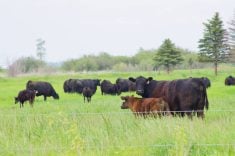As the second week of the Coutts blockade ends, the road to Alberta’s beef export gateway is in a hard lockdown with no traffic getting through.
The heads of the beef industry’s leading producer groups are calling for the opening of the border before the blockade’s damaging effects run through the entire supply chain in the heart of the nation’s meat producing region.
“They’ve made their point,” Bob Lowe, president of the Canadian Cattlemen’s Association, said about the protesters at the border. “The point has been made, but it’s hindering trade and we need trade and in particular in agriculture and in particular in the beef industry.”
Read Also

House ag committee to undertake several studies
The House of Commons standing agriculture committee has set its agenda for the coming months. Members began the fall sitting with a two-hour update on international trade
Lowe said Alberta’s three major packers produce enough beef to feed 43 million people. And in a province with a population of a little more than four million, cutting the province’s trade artery to its main beef recipient in the United States could result in a serious wound to cattle producers that will only get deeper the longer the blockade continues and across the supply chain as packers reduce production.
Melanie Wowk, chair of Alberta Beef Producers, said the blockade has the potential to cripple one of the province’s leading economic engines.
“We don’t always agree on everything, but one thing we do agree on is that we have to keep things moving,” she said yesterday.
“It’s essential for the feedlots, it’s essential for the boxed beef, it’s essential for feed. And that is our message at the end of the day.”
Commercial traffic through the Coutts port has been disrupted since the blockade began Jan. 29.
Demonstrators responded to Premier Jason Kenney’s announcement on Feb. 8 lifting vaccine passport requirements by doubling down and closing the highway outside the village of Coutts.
Protesters are seeking a complete, immediate and permanent removal of all public health restrictions linked to the COVID-19 pandemic.
Janice Tranberg, president of the Alberta Cattle Feeders Association, said it’s still unclear how badly production is being affected at two of the nation’s largest meat processing facilities — Cargill in High River and JBS in Brooks.
Transportation of live cattle to the U.S. is moving at a “snail’s pace” while returning cattle liners coming back to Canada are also being slowed, said Tranberg.
“Our industry is very integrated. In the beef sector we all certainly rely upon each other, and every piece of the value chain needs to work collectively together,” she said.
“People have long memories, and I think there is a reminder that we all need to work together and we can’t be hurting our own.”
As of Friday morning, no traffic was getting through Coutts and as the third weekend of the blockade begins, protesters at the southern Alberta border crossing are anticipating crowds to swell with supporters as multiple protests are planned across Western Canada.


















